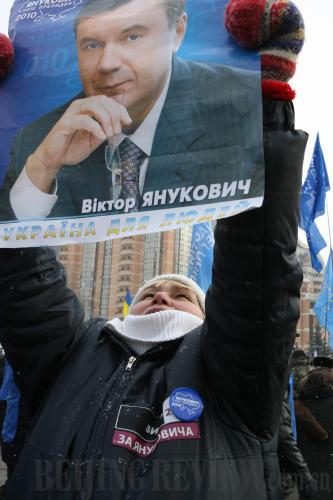|
 |
|
CAUSE FOR CELEBRATION: Viktor Yanukovych's supporters celebrate his presidential election victory in Kiev on February 8 (MU LIMING) |
After a hard-fought campaign—and a narrowly won election—opposition leader Viktor Yanukovych was at last sworn in as Ukraine's new president on February 25.
Despite the abundant speculation before the ballots were opened, Ukrainian people showed the world the new tomorrow they seek through the ousting of President Viktor Yushchenko and Prime Minister Yulia Tymoshenko—both leaders of Ukraine's Orange Revolution.
But this hardly solves the questions at hand for the nation. For instance, while Moscow has made no secret of its desire to include Ukraine into the Russian-led common economic space and customs union, the EU and the United States hope Ukraine continues on its path to Euro-Atlantic integration. As it stands, the world awaits the direction that the new president will choose.
Moreover, Yanukovych faces pressing domestic problems as well. More specifically, the economic difficulties and national unity issues within Ukraine's borders are far more urgent for him than developing stable, beneficial relations with foreign countries.
Domestic politics
Establishing a unity government will be a key task for Yanukovych. According to the Ukrainian Constitution, the government implements Ukraine's domestic and foreign policies, while the parliamentary majority has the right to nominate a prime minister.
Although the president decides the country's diplomatic, military and security affairs, his policies cannot be effectively carried out without the full cooperation of the government.
Before the presidential election, Yanukovych said that, were he to win the election, he would dissolve the parliament and form a new majority led by his party, the Party of Regions.
This would fashion a new political dynamic featuring a joint leadership headed by both the president and the prime minister.
Judging by the current pattern of political power emerging in Ukraine, Yanukovych appears to possess the mandate to do so. Ukraine's parliament passed a no-confidence motion on March 3 against Tymoshenko, forcing her and her government to resign.
Tymoshenko, who refused to recognize Yanukovych's presidential victory, has indicated that she would rather join the opposition instead of joining a unity government. Thus Yanukovych must now bypass her while establishing a majority coalition in the parliament.
During the first round of the presidential election, the three defeated candidates—Sergey Tigipko, Arseniy Yatsenyuk and Viktor Yushchenko—won a total of 25 percent of the votes.
The three are poised to represent a key force affecting the future of Ukraine's power structure. They have also expressed willingness to cooperate with the new president.
Hopefully, Yanukovych will successfully establish a new government through a coalition with the three ex-candidates, as well as the Communist Party of Ukraine and the Ukrainian People's Party.
Economic tasks
Not surprisingly, the difficulties associated with the world financial crisis proved a significant factor in Yanukovych's presidential victory.
Swept up in the maelstrom, the Ukrainian people pinned high hopes on Yanukovych to reverse this difficult situation. His ability to tame domestic markets while creating a lasting economic stability, therefore, is a must if he wishes to maintain his place in office.
| 